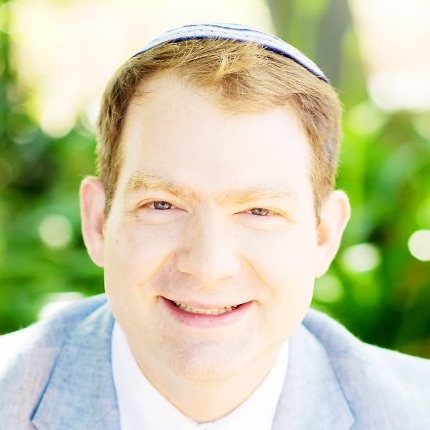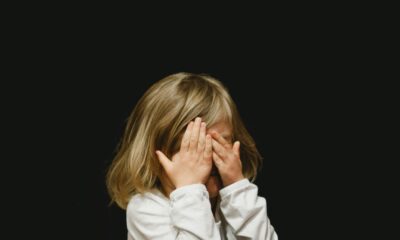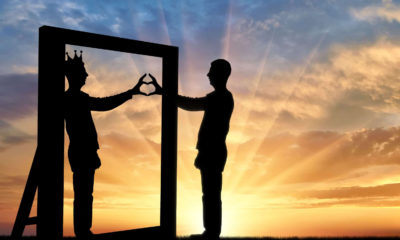
OpEds

He was a hero until he was a monster
עַל אֵלֶּה אֲנִי בוֹכִיָּה עֵינִי עֵינִי יֹרְדָה מַּיִם (For this I weep – tears stream from my eyes.) (Eicha/Lamentations 1:16)
It’s this verse, that for so many years I have sung while sitting on the floor in mourning on Tisha B’Av, that came to my mind when reading about the horrific crimes of Chaim Walder and the way in which he caused such harm to so many people.
The background, for those who don’t know, is that he was one of the most important children’s authors in the religious Jewish world of this generation. His books filled bookshelves in much the same way as Julia Donaldson’s books do now, or Dr Seuss or Roald Dahl’s once did.
He was a therapist who specialised in working with children who have suffered trauma and abuse. He was a popular columnist, radio personality, and an example to many of how to help children express themselves and their emotions, to understand and to be understood.
I read his books to my own young children, and was so impressed by the way in which he was able to show the world from a child’s perspective.
He even received the Magen LeYeled/Defender of the Child award from the Israel National Council for the Child in 2003.
Although his work primarily focused on the Haredi community, it went far beyond that. Translated into eight languages and with readers in virtually every Jewish community, he was a hero, a role-model, and a powerful example of how children could be empowered and respected.
Until it was discovered that Walder was a monster. From November last year, increasingly disturbing allegations began to emerge about his sexual abuse of women and children, abuse purportedly going back decades.
The chief rabbi of Tzfat, Rabbi Shmuel Eliyahu, initiated Beth Din proceedings and received damning testimony that uncovered a pattern of such abuse going back decades.
It turned out that he had consistently and systematically abused his access to and position of power and influence with children to assault them in the most terrible way.
Behind the mask of the Defender of the Child was a manipulative predator seeking to harm the most vulnerable among us. Around the same time, Israeli police opened investigations into his wrongdoings. At this point, Walder took his own life to escape the net closing around him.
The way in which all this unfolded was shocking, confusing, and so tragic. First, we must think of his many, many victims, the terrible pain and shame he inflicted upon them, and the way in which their lives were so profoundly affected.
The mental and emotional scars can last a lifetime. One of his victims, Shifra Yocheved Horovitz – only 24 years old – committed suicide a few days ago. Many others will have to come to terms with what was done to them in crimes for which they aren’t guilty and bear no responsibility. However, they so often, nonetheless, hold onto feelings of profound humiliation and guilt. It’s for them that I weep when I think of this terrible affair.
Second, for many – myself included – it has taken a while to truly understand and wrap my head around this. We are living through a time of crisis in trust, when trust in governments, news agencies, and authorities are at a record low.
When hearing these worrying reports, I had to wonder whether it was actually true or whether it had been sensationalised – even fabricated – as he and his defenders claimed?
How could I reconcile the sensitive, understanding, and compassionate voice of Walder’s books with testimony about a serial predator and abuser?
And even if the most terrible thing turned out to be true, what could I do about it anyway?
There are many who were far quicker than I, many who immediately realised the gravity of the situation, who publicly criticised Walder for his crimes and expressed support for his victims and victims of abuse generally. To those I say, thank you.
There are others who are still figuring this out, and others still who remain in support of Walder.
As I said, I believe this is an issue of trust. Do they trust Rabbi Eliyahu and his Beth Din? The many victims and witnesses who have come forward, or those who defend him and believe the case to be libel?
Although more and more rabbonim and leaders in the Jewish world are coming out against Walder and his actions, it’s difficult to tell someone who to trust. However, I do want to address the dynamic around trust, openness, and lashon hara.
In my years as a community rabbi, I have had to deal with several instances of abuse. Although I’m not an expert in this area and careful not to go beyond the limits of my knowledge, I’m grateful to have been able to direct such people towards our community organisations and professionals who deal with such cases.
We are, indeed, blessed with men and women who can handle such cases with the appropriate seriousness and sensitivity, and they should always be our first port of call. They can guide us towards appropriate police reporting and whatever else needs to be done in such situations.
I won’t deny that I’ve also heard accusations about people and organisations which have turned out not to be abuse but the sorts of two-sided conflict that are an unfortunate but prevalent part of human life and interaction.
Nonetheless, when one believes that there is abuse, the first and most important step is to report it. Similarly, if a friend confides that there has been such abuse, one has an obligation to share it with those who can help and who can take action, even if it means breaking that confidence.
But is it not the case that trust, confidentiality, and respect for human dignity are cornerstones of Judaism, and that such reporting can undermine these?
There are a few answers to this question. First, there is nothing more important than the value of life. The Torah tells us, “לֹא תֵלֵךְ רָכִיל בְּעַמֶּיךָ לֹא תַעֲמֹד עַל דַּם רֵעֶךָ אֲנִי ה” (Do not go as a talebearer amongst your people, and do not stand by while the blood of your fellow is shed – I am Hashem.) (Vayikra/Leviticus 19:16)
The same verse that warns us against lashon hara warns us against standing by when someone is in danger, and as we see from the late Shifra Yocheved Horovitz of blessed memory as well as far too many others, abuse kills.
It’s our duty to protect and help people, even when that means losing the trust of victims who feel too ashamed to speak out, or challenging the reputations of the highly respected. As a friend of mine said, “The laws of lashon hara weren’t given to protect criminals.”
The verse with which I began this article, the sadness and the weeping, continues. “כִּי רָחַק מִמֶּנּי מְנַחֵם” (For the comforter is far from me.) Who can comfort us in the wake of such a tragedy? How can we find meaning or consolation? That’s beyond me.
I have removed Walder’s books from my shul and my home, but it seems like a small gesture.
I speak to my children about appropriate and inappropriate touching. At home, we have a “no-secrets” policy – there’s no such thing as a secret that you cannot tell mom and dad. I do these things, as I was taught by professionals who deal in these matters, in the same way that I teach them about crossing the road – with all due seriousness, but without panic. And I write this article.
Perhaps we can find some measure of comfort in creating a healthier community dynamic and conversation about abuse, one in which the victims are empowered to speak and to act, and one in which we take them very seriously indeed.
Hashem yerachem – may Hashem have compassion upon His children.
- Rabbi Sam Thurgood is the rabbi at Beit Midrash Morasha @ Arthur’s Road.











yitzchak
January 13, 2022 at 3:37 pm
The religious communities have always swept these crimes against minors under the carpet.
The community needs one hot line to report these pederasts. and then to hand them over to the state police for proseecution.